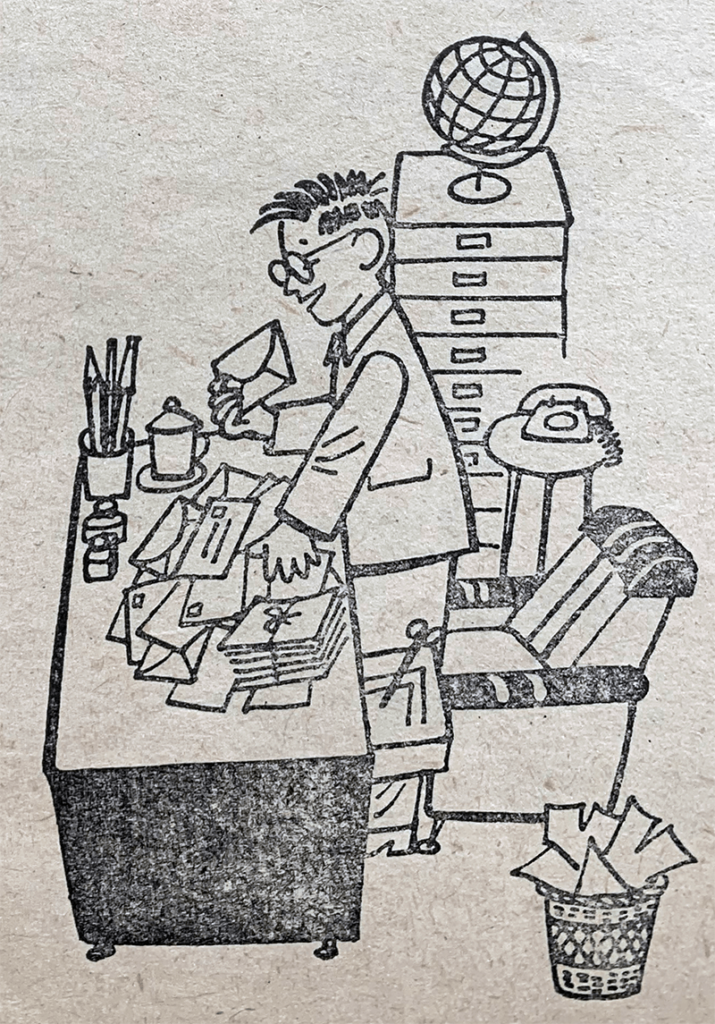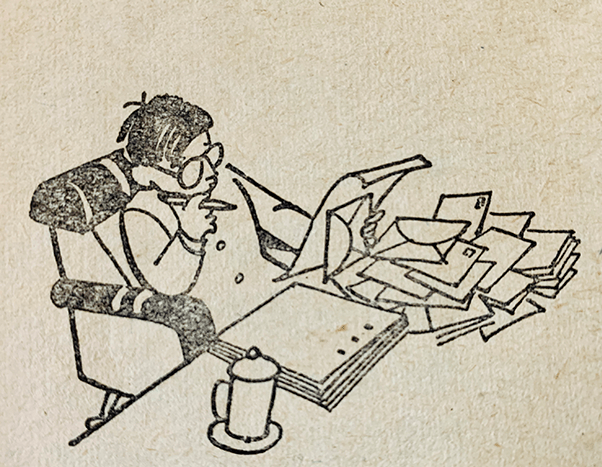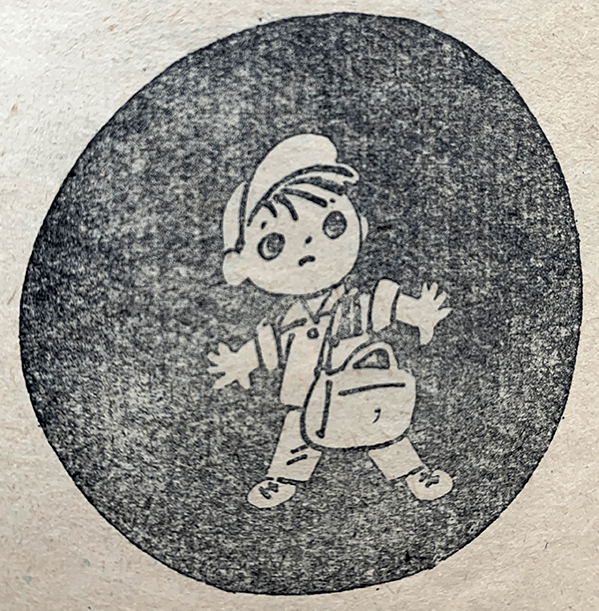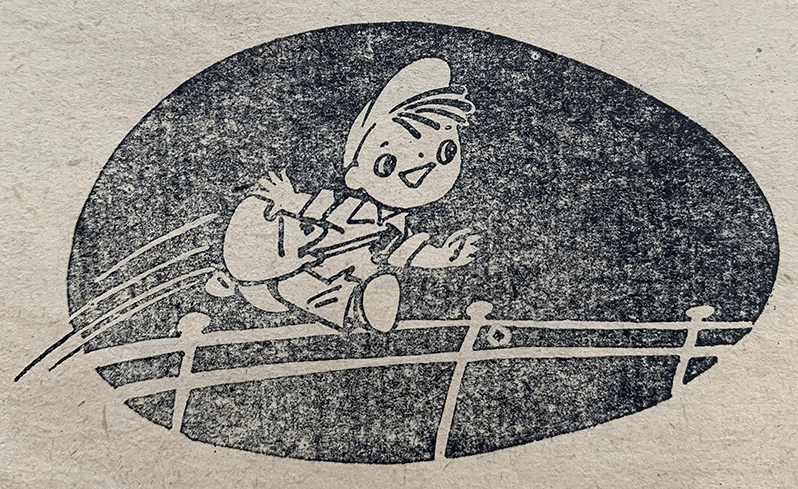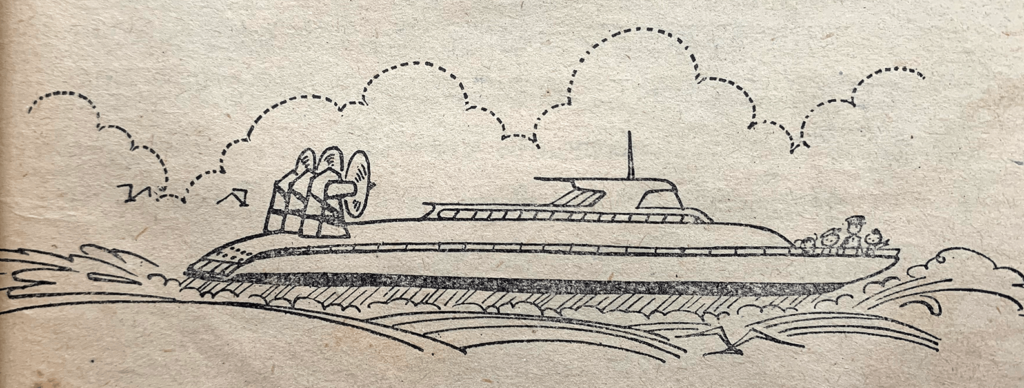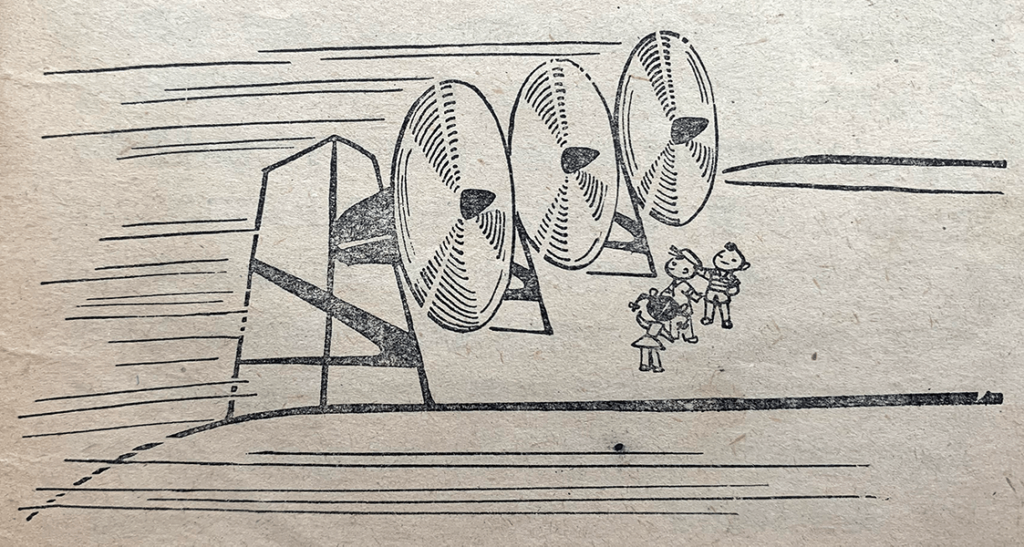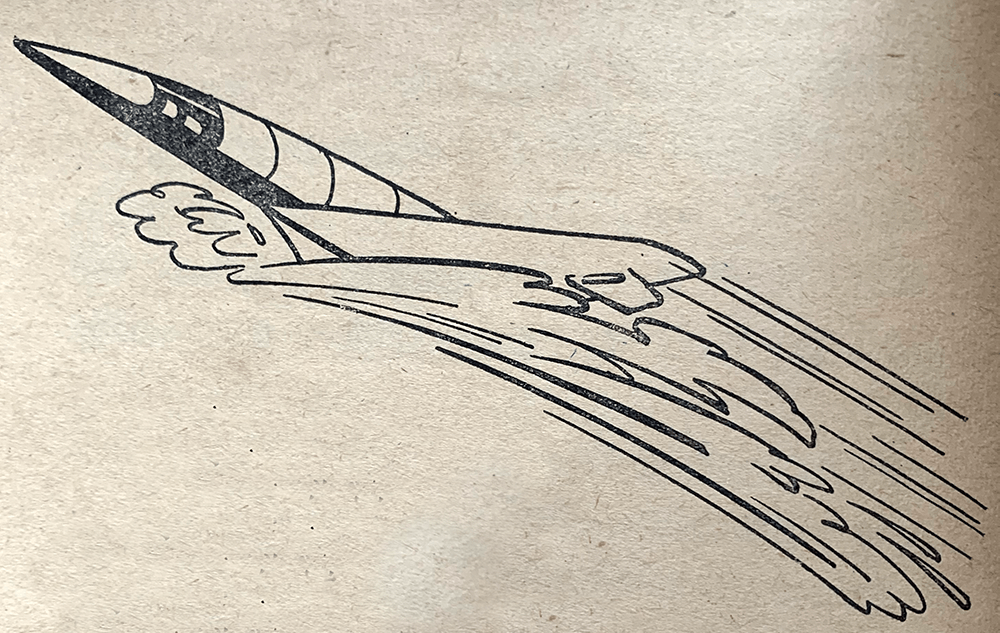What follows is the first instalment of a six-part draft translation of Ye Yonglie’s 叶永烈 (1940–2020) classic illustrated children’s chapter book Little Smarty Visits the Future 《小灵通漫游未来》, first published by Young Children’s Press 少年儿童出版社 in Shanghai in August, 1978, with illustrations by Du Jianguo 杜建国. Ye passed away on May 15 of this year, and his son, Ye Dan 叶丹, has kindly given me permission to translate this groundbreaking work into English. In order to reach the widest possible audience, I will will be posting my translation online. International rights are held by the Ye family. Interested publishing houses can contact me here. To read a recent translation of a lianhuanhua (comic book) adaptation of Little Smarty, also available in its entirety online, see here.
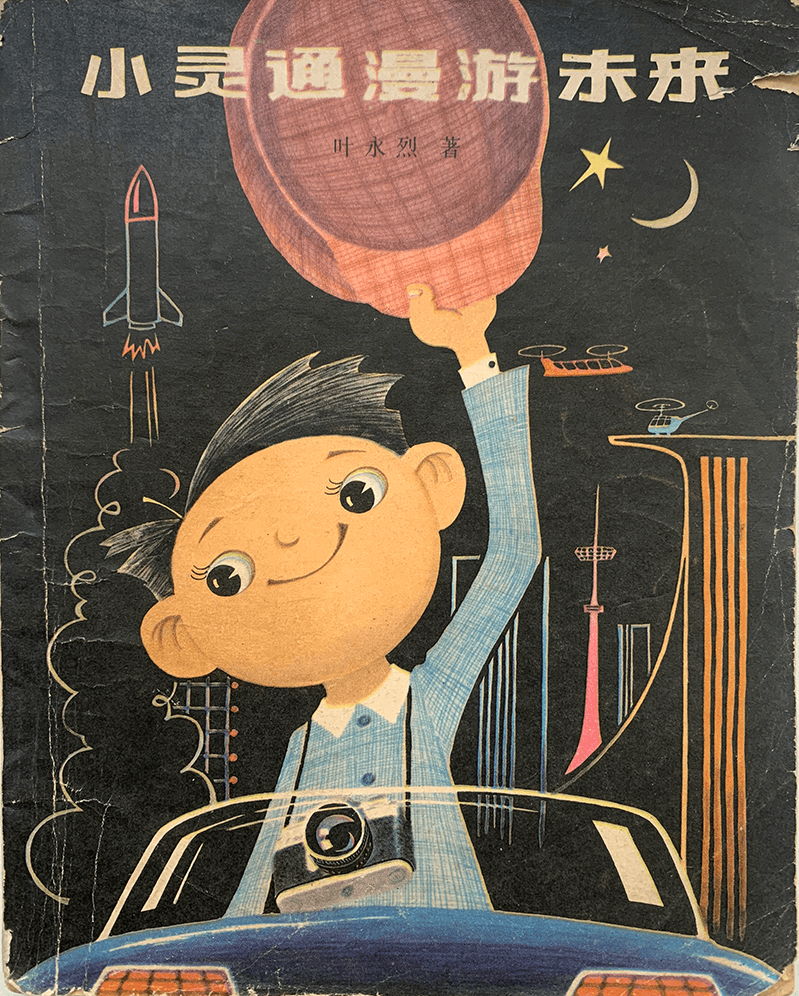 |
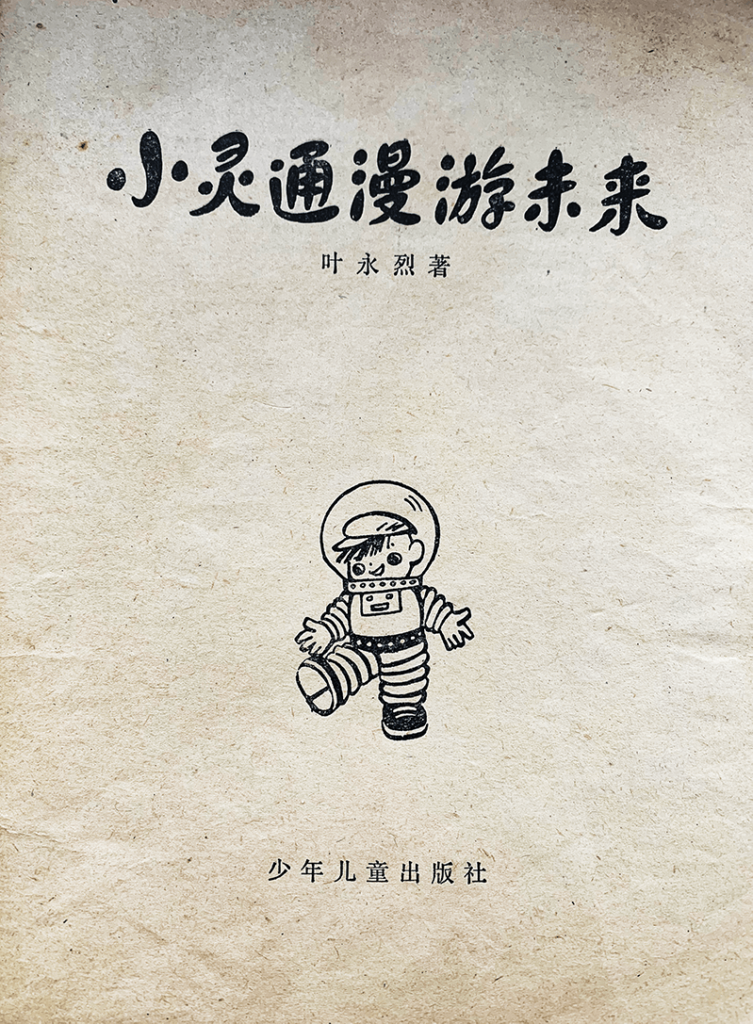 |
Summary of Contents
This is a scientific fiction novel. Through the story of Little Smarty Visiting the City, the long-term prospects of future scientific and technological development and the People’s shining happy lives are shown. The work introduces hovercraft, videophones, videowatches, mini-helicopters, flying cars, robots, artificial rice and protein, hydroponics, multicolored cotton, 3D movies, the school of the future, and more than two dozen other new sciences and technologies. The content is rich and colorful, the story is vivid and interesting, completely pulling the reader in. In the mobilization of the Four Modernizations, in regards to cultivating children’s love of science from a young age and raising children’s interest in science, this work has positive educational value.
Contents
Preface……………………………………………………….1
Losing Baby………………………………………………..6
A Fortuitous Encounter…………………………………8
The Strange Vessel…………………………………….11
The Talking Box…………………………………………19
The Videophone…………………………………………20
Cars Like Beads of Water…………………………….22
The “Iron Egg”……………………………………………31
In Xiao Hu’s Room……………………………………..37
Changing Organs……………………………………….40
Plastic World……………………………………………..42
A Bizarre Lunch………………………………………….44
Cleverly Disposing of Dirty Oil……………………..49
An Interesting New Kind of Movie………………..52
The Colorful Nightscape of the City……………….58
School in Futurecity…………………………………….63
A Satisfying Weather Forecast………………………74
The Magic Factory……………………………………….77
The Mistake in the Marquee…………………………87
The Miracle on the Farm……………………………..92
Taking a Ride on a Rocket…………………………..110
A Letter from Little Smarty………………………….119
Afterword………………………………………………….122
Preface
[p1]
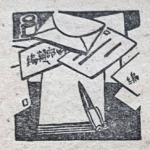 I’m not that old——if you add your own age to your little brother’s age, then that’s about how old I am. Everyday, I receive tons of letters. Every letter begins the same: “Dear Big Friend Editor: Hello!”
I’m not that old——if you add your own age to your little brother’s age, then that’s about how old I am. Everyday, I receive tons of letters. Every letter begins the same: “Dear Big Friend Editor: Hello!”
It’s really true, isn’t it? Compared to all of you ‘little friends’, [as we like to call children here in China] I really am a ‘big friend.’ But I really do have lots of little friends. I wouldn’t be at all exaggerating if I were to say that I have little friends around every corner.
Everyday, the postperson gives me a big bundle of letters. Some are from Shanghai, others are from Beijing, Jiangsu, Hunan, Jilin, Sichuan, [p2] Gansu; there are also letters from Heilongjiang, Xinjiang, Hainan Island and Tibet. In these letters from all corners of our country, at least six or seven out of ten asks, “What’s the future going to be like?”
Just look, here’s one I received just yesterday, from a little friend in Beijing:
Dear Editor Big Friend,
Hello!
My name is “Ai Kexue” [Love Science], but they also call me “Xiao Huanxiang” [Little Fantasy]. I’m eleven years old this year, in the fourth grade.
What I really want to know is: what our country will be like when I’m one hundred years old. By then, can we have a little plane that can fly me here and there, from Beijing to Mt. Everest? And then, just like that, from the highest peak in the world back home. Will a little plane like this be possible in the future?
I want to know everything about the future, everything!!
Dear Editor Big Friend, please reply straightaway!!
Sincerely,
Ai Kexue
Giving the Young Pioneer Salute from the capital in Beijing
[p3]
I receive letters like this one from “Ai Kexue” nearly every day. Even though I wanted to pick up my pen to dash off a response right away, when I sat down to write, not a single word came out. Heavens, I don’t know what the world of the future will be like, how on Earth am I supposed to answer a question like this?
Like many children, I also really want to know anything and everything about the future.
What’s to be done? In their letters, my little friends all said, “I eagerly await your reply,” or “As soon as you get this, send your reply”… Some little friends even underlined these words in red pen, or circled them! Even worse, some of these requests weren’t even the first time they had written me to elicit a reply.
It wasn’t until last month that I finally came up with a solution: I brought up the matter with a young reporter who works in our editorial office — Little Smarty.
You don’t know little Smarty? Oh, in our office not only does everyone know him, but he’s pals with each and every one of us. Little Smarty is just about your age. Even though he’s just a kid, he really knows it all. Not only does he know about things that have just happened all around the world, but he knows what is just about to happen, too. And not just that, whether it’s in ten years or one hundred, he knows exactly what’s going to happen.
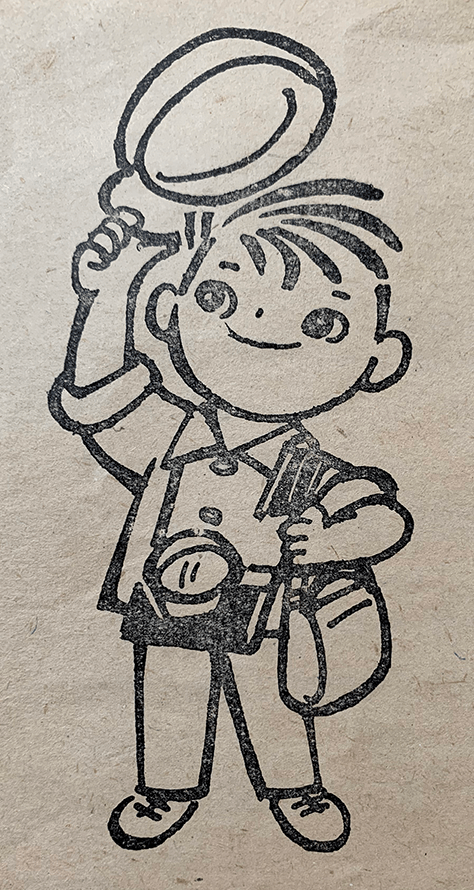 Little Smarty is clever and lively, with eyes as dark and shining as the feathers on a crow, two big ears, and a loveable little round face. The way he walks, he’s always half-way running, with quick little steps, like a gust of wind. Usually, I’ve only just heard the door open, but when I look up he’s already standing in front of me. It’s on account of his bright eyes and quick ears that Little Smarty knows so much, not to mention his quick legs and nimble fingers, and his dedication to his work.
Little Smarty is clever and lively, with eyes as dark and shining as the feathers on a crow, two big ears, and a loveable little round face. The way he walks, he’s always half-way running, with quick little steps, like a gust of wind. Usually, I’ve only just heard the door open, but when I look up he’s already standing in front of me. It’s on account of his bright eyes and quick ears that Little Smarty knows so much, not to mention his quick legs and nimble fingers, and his dedication to his work.
It doesn’t matter when it is, he’s always kitted out for the task at hand: a thick reporters pad stuffed in his pocket, a bag slung over his shoulder, the bag bulging with this and that, but most of all, his “baby” — his camera.
And what about on his chest? He always has a fountain pen clipped there. It’s about as thick as carrot, and has a terrible thirst, gulping down a whole bottle of ink in one go. That way it never “breaks down” when he’s in the middle of an interview — by running out of ink.
Little Smarty is my best friend, and also my best assistant. As soon as he heard that my little friends wanted to know about the world of the future, he immediately set off to conduct his interviews.
Not long after, Little Smarty sent in his copy. I hurriedly ripped open the package, and saw the first line, which read:
Little Smarty Visits the Future
The writing was really something else, and I finished in one sitting. I decided right away to have it published. Once it’s printed, I’m planning to send a copy to each of my little friends who wrote to ask, “What will the future be like?” as the official response from our editorial office.
What follows is Little Smarty’s travel diary — Little Smarty Visits the Future.
Chapter 1: Losing “Baby”
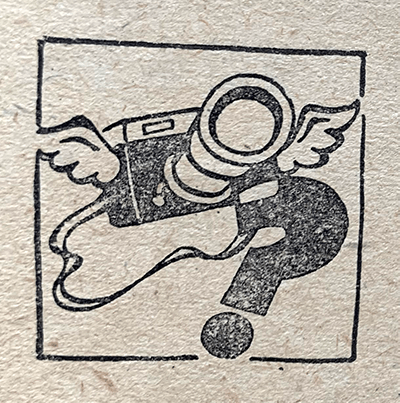 Sheesh! I’ve got more stories to tell than a cow’s got hairs.
Sheesh! I’ve got more stories to tell than a cow’s got hairs.
Where should I start? I know, I’ll begin with my “baby” — the story of how I lost my camera! If I’m being honest, I think the whole strange business started with me losing my camera.
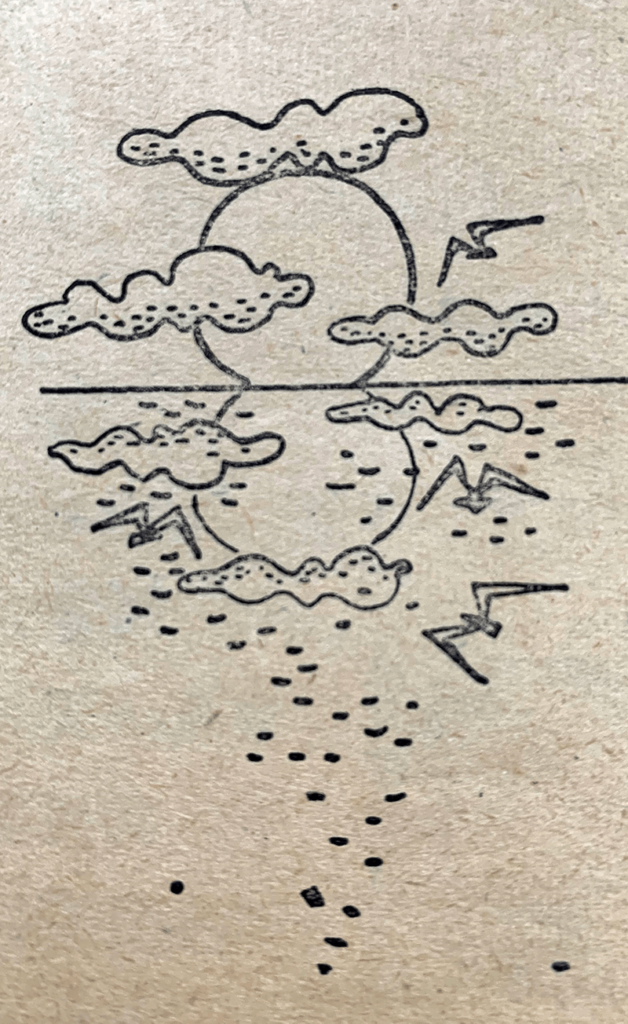 I remember it was dusk, and I was walking by the river. The blood-red setting sun lit up the surface of the water, saturating it with bright color. A breeze came up, sending ripples across the water, like a length of red silk floating through the air. It really was incredibly beautiful.
I remember it was dusk, and I was walking by the river. The blood-red setting sun lit up the surface of the water, saturating it with bright color. A breeze came up, sending ripples across the water, like a length of red silk floating through the air. It really was incredibly beautiful.
I couldn’t help myself: I had to take a picture of this “river scene” straightaway!
Oh no! I looked in everywhere in my shoulder bag, taking out my water bottle, my pocket knife, eraser, pencil…until every last thing had been taken out, even tipping my bag upside down to shake it out. But still, there was no sign of my “baby” — my camera.
 I remembered that when I set off in the afternoon, I knew I’d put a big rock of a thing into my bag — how could my camera just go missing like that?
I remembered that when I set off in the afternoon, I knew I’d put a big rock of a thing into my bag — how could my camera just go missing like that?
My camera is my closest friend, my good little “baby” — a genius “artist.” Or actually, a genius “sketch artist.” As a news reporter, how could I [p7] lose my number one weapon. Camera, where are you?
After looking everywhere, I dove into the thick woods, sitting on my bum and feeling around on the ground with my hands. As I watched the sun sink lower and lower in the sky, I became even more anxious.
Gosh, since when did it get dark so fast? It was almost night.
With sore feet and torn clothes, I soon realized I was totally worn out. I looked up and saw the sky was as dark as a pot bottom. I thought I’d better hurry back to the hostel. All I could think was that I had been mistaken about having put my camera in my bag that afternoon. Who knows, I thought, it’s probably sitting on my desk right now!
Chapter 2: A Fortuitous Encounter
 Only, just then I encountered my second piece of bad luck: the sky had gone pitch black, with the moon nowhere to be seen. Feeling about here and there with my hands, I ended up completely turned around, without the faintest idea of way back to the hostel. I was lost!
Only, just then I encountered my second piece of bad luck: the sky had gone pitch black, with the moon nowhere to be seen. Feeling about here and there with my hands, I ended up completely turned around, without the faintest idea of way back to the hostel. I was lost!
The silence so total that you could have heard a pin drop. There wasn’t a soul to be seen on the riverbank. The only sound was the soft shushing of the pine trees in the wind. I loitered by the water’s edge, unsure of where to go. Head down, I walked and walked until suddenly, through the darkness, I caught sight of a white railing. Beyond the railing I could just make out the outlines of a white lounge chair.
Overjoyed, I leapt over the railing in one go, like it was a hurdle in a track and field event. The feeling of relief I had plopping down into the lounge chair was indescribable. To make myself even more comfortable, I propped up my shoulder bag under my head as a makeshift pillow. [p8]
I’d only planned on taking a short rest. I’m not sure how it happened, but my eyelids felt like they weighed a ton, and I could barely keep them open. Before I knew it, I was sleeping like a baby — and even dreaming!
In my dream, I was back on the grassy riverbank, searching high and low for my beloved camera. Looking here, looking there, in the dark and gloomy woods. Just then I saw two gleaming green lanterns — I was starring a tiger straight in the eyes! Scared stiff, I started to shake all over. Teeth flashing, claws outstretched, the tiger let out a mighty roar.
“Help! Help!” I shouted, falling backwards to the ground.
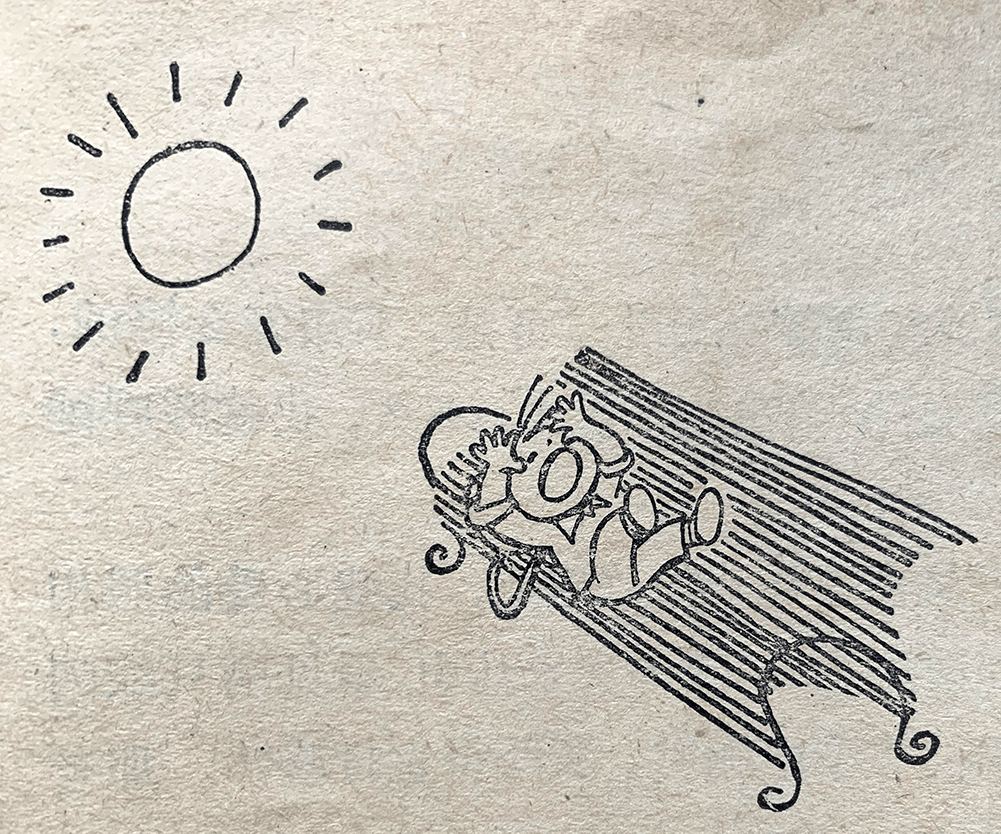 Just then a beam of golden light fell across my tightly shut eyes. The night sky was turning to day, filling the east with sunrise, staining the heavens red as the sun emerged from below the horizon. It wasn’t until I had rubbed the drowsiness out of my eyes that I realized it had all been in a dream.
Just then a beam of golden light fell across my tightly shut eyes. The night sky was turning to day, filling the east with sunrise, staining the heavens red as the sun emerged from below the horizon. It wasn’t until I had rubbed the drowsiness out of my eyes that I realized it had all been in a dream.
Looking all around, I saw trees tops speeding past.
How can this be? Do I have a case of the spins?
I quickly got up. Heavens! I was on a enormous ship of some sort. Just then the boat let out a great blast of sound, which I recognized as the ‘roar’ of the tiger from my dream. It had been the ship’s foghorn all along!
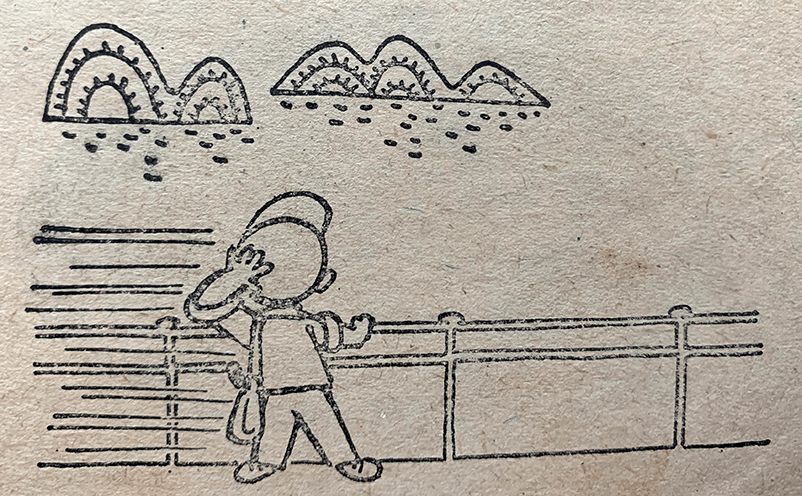
Inspecting my surroundings more closely, I realized something else. That white railing I had jumped over in the middle of the night? That was from the ship too, just like the lounge chair I’d slept on, which I could now see was sitting on the ship’s deck.
How on Earth can this be?
[p11]
Chapter 3: The Strange Vessel
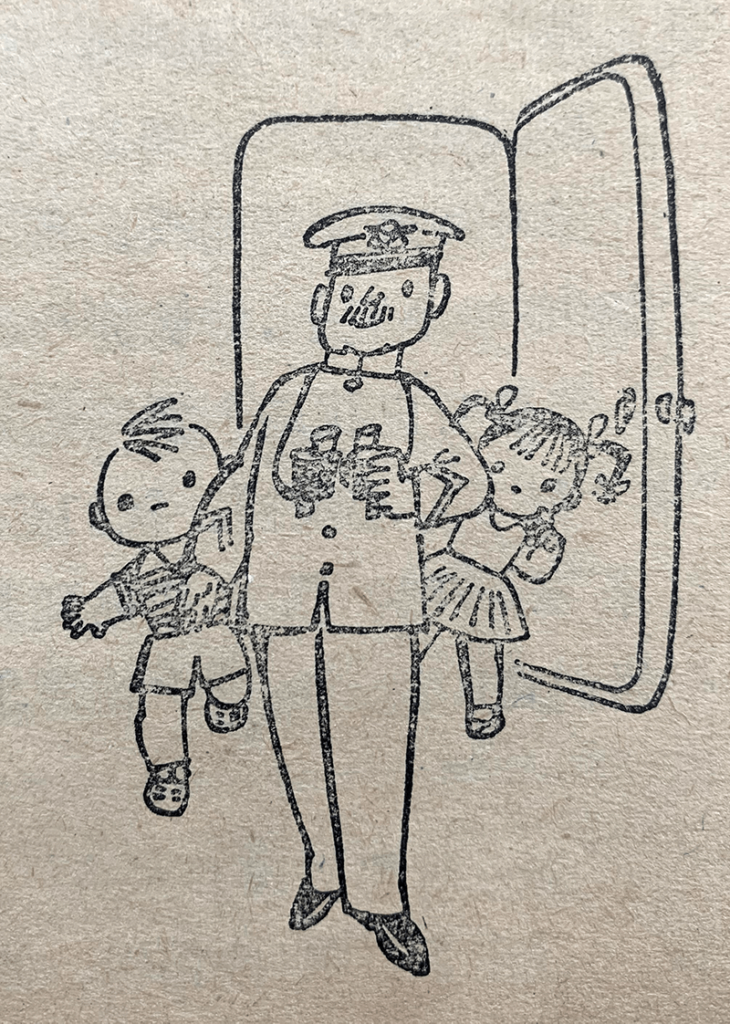
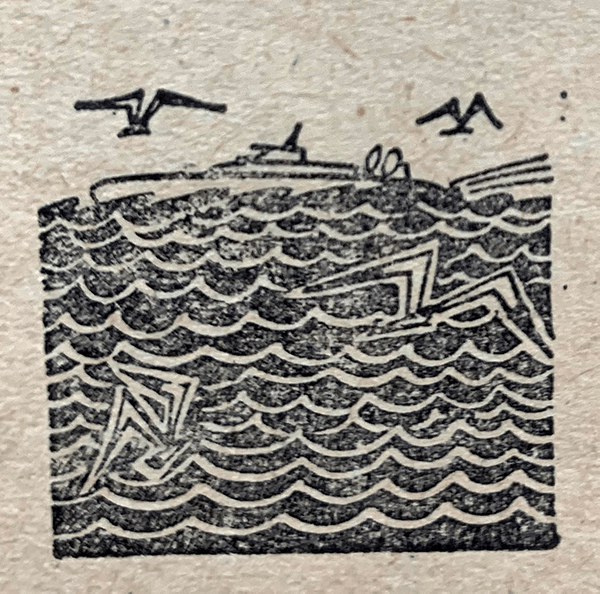 “What happened? What happened?” Suddenly, the passageway door opened and old man in cream-colored uniform and a peaked cap rushed out. Around his neck he was wearing a pair of binoculars.
“What happened? What happened?” Suddenly, the passageway door opened and old man in cream-colored uniform and a peaked cap rushed out. Around his neck he was wearing a pair of binoculars.
In a clatter, two children came running behind: first a boy, just about my height, and then a girl, at least a head shorter than me.
“Were you the one who was calling for help?” the old man asked me, sitting down beside me to pat me on the head.
I took the opportunity to study the old man’s face: the skin was weather-beaten, like old bronze, and from beneath his nose sprouted a thick, white moustache. A golden badge gleamed [p12] on the band of his cap. From these details, I surmised that he was the captain of the ship. His brow, meanwhile, was furrowed into three lines, like the character for ‘stream’—it was clear that he had absolutely no idea was going on.
I sighed nervously, feeling a little embarrassed. But there was nothing for it, so I faithfully recounted the comical turn of events from the previous evening, not leaving out a single detail.
Chuckling loudly, the old man squinted at me, smiling broadly. Laughing, the boy rocked back and forth, his mouth gaping so wide you could have practically crammed an apple in without him noticing. Tittering and covering her mouth with one hand, the little girl couldn’t keep herself from laughing either. She went on like a machine gun, strafing away until her eyes welled up with tears.
Once we got to know each other, we made fast friends.
It turned out that the old man really was the captain. The two kids were his grandson and granddaughter: Xiao Hu (Little Tiger) and Xiao Yan (Little Swallow).
When the old man heard that I was a journalist, he happily patted me on the head and said, “That’s wonderful, Little Smarty. My ship is head to Futurecity. You haven’t already been, have you? You’re more than welcome to stay in our home. After a few days, once you’ve seen the sights, you can report all there is to report about our brand new town. That way you can share what you find with your little friends back home.”
“Oh, you must stay at our house!” Xiao Hu said. “My father is in the same profession as you—he’s the editor of the Future Daily newspaper. I’m certain he would love to meet you.”
[p13]
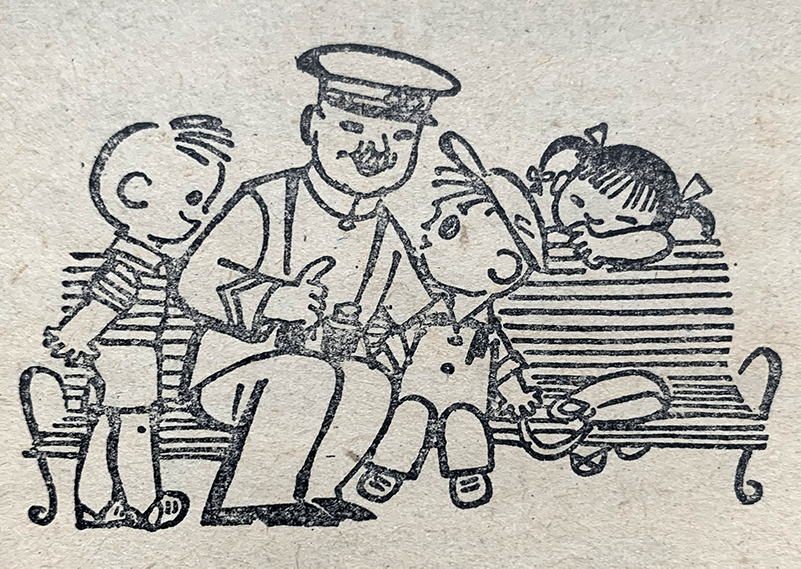 Sitting on the white bench, we continued to chat away happily. Just then, a light breeze came up off of the river — it was delightfully refreshing.
Sitting on the white bench, we continued to chat away happily. Just then, a light breeze came up off of the river — it was delightfully refreshing.
Around this time, I brought up the question that had been troubling me: as far as I understood, the boat dock was on the river. But I’d spent last night fumbling around the woods, and later on the grass. I remembered quite clearly that I’d been in the field when I came across the white railing, jumped over, and stretched out on the bench. How could it be that all of sudden I was on a boat?
Cautioning me to hold tight to the railing, the old man told me to take a look under his ship. It was then that I realized this was no ordinary boat: we were floating through the air, above the surface of the water, as if we were sailing on a cloud, or mist, over the river!
The old man said, “This ship is a new kind of boat, called a “hovercraft.” There is an enormous fan attached to the ship which pushes a constant draft of air down underneath, causing the whole [p14] vessel to float in the air, above the water.””
This way, when it set sail, not being limited by water, the ship could travel at the speed of flight. For the same reason, the ship could travel over land as well—it floated over earth as well as water, rising above the ground. Last night they had left the river to take a rest from their journey. They had turned off the mechanism and set down in the field. That was when I had climbed over the railing to take my nap on the bench. At daybreak, when the hovercraft set sail again, heading back out on the river, I was still sound asleep. It wasn’t until the rays of the sun reached my face that I saw the tiger in my dream, his eyes glaring like lanterns, startling me awake…
The hovercraft cruised over the river as fast as lightning. To start, the river had been yellow, full of silt. But gradually, as it broadened out, the water gradually turned blue. The old man told me that ship had already left the river and entered the sea. Looking back, I saw that only the water near the bank was yellow, giving the appearance of a massive blue carpet with gold fringe. Eventually, the fringe disappeared, and everywhere I looked was the sea, until it was hard to tell where the sky ended and sea began. With the translucent seawater reflected the blue of the sky, it was the most beautiful seascape I’d ever seen.
“Little Smarty, you’ve never been to sea before, have you? I’m 80 years old this year, so I’ve already spent 60 years on the ocean. Take a look, our nation’s sea is so magnificent, so vast!” the old man said, gesturing to the boundless sea as he spoke.
Spellbound by the great expanse, I couldn’t help but start to sing, “I Love the Blue Ocean”:
I love the blue ocean,
Our nation’s sea borders are magnificent and vast…
[p15]
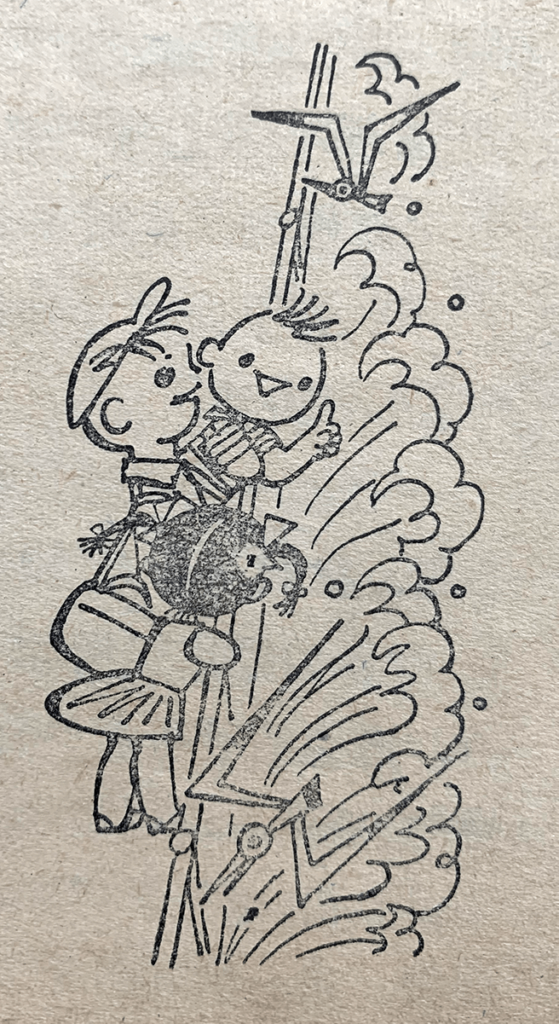 The old man said that he had some things to take care of, and with that headed for the bridge, leaving behind his two grandchildren, Xiao Hu and Xiao Yan, to accompany me.
The old man said that he had some things to take care of, and with that headed for the bridge, leaving behind his two grandchildren, Xiao Hu and Xiao Yan, to accompany me.
Xiao Hu was sturdy little fellow, wearing a blue and white striped sailor shirt. With his face dark and rosy from the sun, under two bushy black eyebrows were two shining black eyes, while above his forehead a tuft of “stubborn” hair stuck up in a comical way. Xiao Hu didn’t just look strong — the first time we met, his handshake nearly gave me a cramp! I really couldn’t tell if he’d done it on purpose or not, as a way of “showing his strength” and letting me know how tough he was.
With a friend like Xiao Hu, you really wouldn’t have to worry about feeling alone. His mouth was like the loudspeaker for radio, always going on about something or other.
As he confided, “Little Smarty, I can tell you like to talk, too. That’s just how I am. I love to say this, or talk about that. Even when I’m fast asleep at night, my mouth is still, my hands don’t move, but my brain is still going going going—in my dreams. And after a while, my mouth starts moving too, when I start sleep-talking; my hands and feet start moving too, and I kick off the blanket.
Xiao Yan, meanwhile, did her hair up two braids, sticking up out of the top of her head like the horns of ram, with each braid bound with big bright red bows. Her round little face wasn’t sunburnt in the slightest—only her two innocent eyes were just like her brother’s. Her cheeks were [p16] rosy red, like two apples. Quietly listening to her brother and I talk, she never butted in. I thought it was strange. How come Xiao Yan never said a word?
Xiao Hu seemed to notice my unease. He said, “Whenever my sister meets strangers, she corks right up like bottle gourd. She doesn’t say nothing, zip, her lips are sealed.”
With this, he stepped close, cupped his hands together against my ear and whispered, “Little Smarty, don’t underestimate her! Just you wait, she’s always telling me what to do…”
Xiao Hu kept on like that, burbling away. As this was my first time out to sea, I wanted to take a look around. Upon hearing this, Xiao Hu immediately jumped up from the bench and took me by the hand, saying, “I’ll take you around for tour.”
Xiao Yan stood up too.
“You’re not going with us,” Xiao Hu said.
“I am too going!” Xiao Yan pouted. That was the first time I’d hear her speak.
“Oh, let her join us,” I said, turning to offer Xiao Yan my other hand. Xiao Hu to my right, Xiao Yan to my left, the three of us walked along the corridor, until we arrived up on the deck. The sun was shining on the silver deck, which made me think at first that it made of aluminum, like a plane. Acting like a ship’s captain, Xiao Hu repeated what his grandfather had told him—that the hovercraft wasn’t made of aluminum, it was made of a new metal called “titanium.” This metal was a lot like aluminium, as it was very light, but it was more resistant to corrosion, so you didn’t need to worry about seawater getting in. As soon as I heard that, I hurriedly flipped open my notebook and took out my stubby carrot of a [p17] fountain-pen, scribbling down the character for “titanium.”
The wind up on the deck was really something else. It set my notebook aflutter. I looked up and, Huh! What do you know? Installed right on the deck were a row of propellers, whirling away like a row of giant electric fans. Xiao Hu pointed at the propellers and said that the idea was basically the same as the propellers on a plane. As soon as they start turning, a draft is created behind the ship, sending it forward in a flash.
Oh, now I understood: It turned out that the hovercraft had two drafts. One draft was blowing downwards, pushing the whole craft up into the air; a second draft was blowing backwards, pushing the vessel forward. No wonder hovercrafts can fly over the water and the land!
This particular hovercraft was an especially big one, with lots of rooms, and tons and tons of passengers. Xiao Hu took me around the ship, room by room. Xiao Hu hardly broke a sweat, but Xiao Yan was soon out of breath, chasing behind her older brother. Besides for passenger cabins, there was a reading room, a ping pong room, a film projection room…
[p18]
Xiao Hu lead me up to the top deck of the ship where the bright red five-star flag of the PRC was flying in the wind. Xiao Hu proudly informed me that the ship was atomic-powered, meaning that a piece of atomic fuel the size of a soap cake was enough to power the hovercraft for tens of thousands of miles.
Just as he was telling me this, a dark speck emerged in the distance, just over the horizon, growing larger as it approached us.
“I’ll go up and take a look. What the heck kind of ship is that?” With that, Xiao Hu clambered up the flagpole. He really was something else. In a flash, he had almost reached the top. I could tell that he was about to call me for me to follow him up, but when he saw that Xiao Yan was still by my side, he slid back down, just like that. Whispering in my ear, he said, “Forget it, as long as Xiao Yan is here, you’d better not climb up!”
The other ship was getting closer and closer. Hey, the nozzle was round and pointed, like a plane! Xiao Hu told me this kind of ship was called a “hydrofoil.” What was interesting was that two wings stuck out underneath, allowing it to zip across the surface of the water, like a dragonfly skimming across a pond.
A moment later, it had disappeared entirely, leaving only a foamy white wake.
To Be Continued in Part II…
